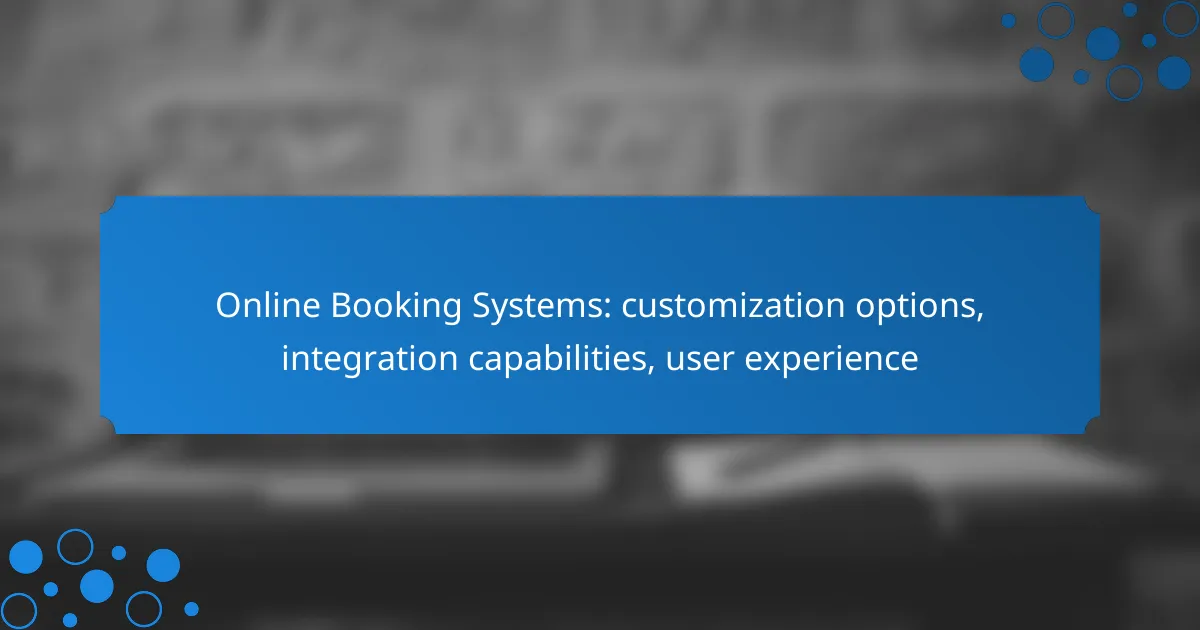Online booking systems have become essential tools for businesses, offering customizable features that enhance user experience and streamline operations. With options for branding, scheduling flexibility, and payment integration, these systems can be tailored to meet specific industry needs. Additionally, robust integration capabilities with CRM systems and calendar syncing further improve functionality and efficiency, making them invaluable for modern enterprises.
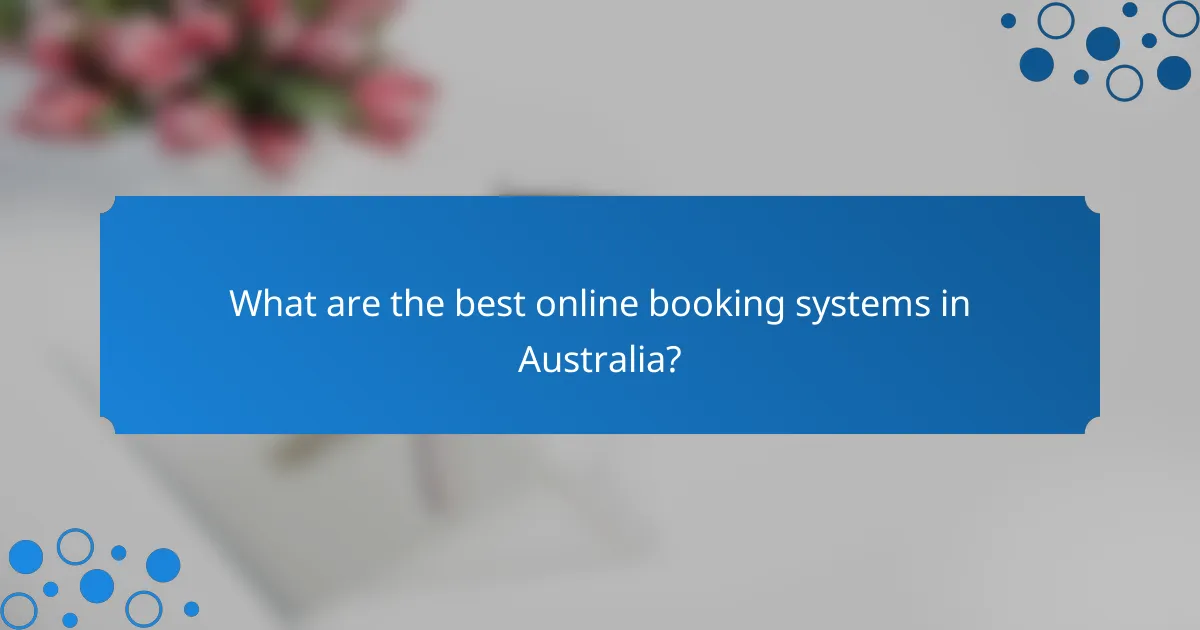
What are the best online booking systems in Australia?
The best online booking systems in Australia offer a range of features tailored to various industries, enhancing user experience and operational efficiency. Key options include Square Appointments, SimplyBook.me, Booksy, Calendly, and Fresha, each with unique capabilities for customization and integration.
Square Appointments
Square Appointments is a user-friendly booking system ideal for service-based businesses. It allows for customization of appointment types, durations, and pricing, making it suitable for salons, spas, and health practitioners.
This platform integrates seamlessly with Square’s payment processing, enabling businesses to manage payments and appointments in one place. Additionally, it offers features like reminders and client management tools to enhance user experience.
SimplyBook.me
SimplyBook.me is a versatile booking system that caters to a wide range of industries, from healthcare to education. It provides extensive customization options, allowing businesses to tailor the booking interface to match their branding.
With integration capabilities for various payment gateways and marketing tools, SimplyBook.me enhances operational efficiency. Users can also set up automated reminders and follow-ups to improve client engagement and reduce no-shows.
Booksy
Booksy is particularly popular among beauty and wellness professionals, offering features designed specifically for this sector. It allows businesses to manage appointments, client profiles, and marketing efforts all in one platform.
Booksy’s integration with social media and its user-friendly mobile app make it easy for clients to book services. The system also provides analytics tools to help businesses track performance and customer preferences.
Calendly
Calendly is a straightforward scheduling tool that simplifies the booking process for meetings and appointments. It allows users to set their availability and share links for clients to book time slots that work for both parties.
While it is not industry-specific, Calendly integrates well with various calendars and communication tools, making it a flexible option for professionals across different fields. Users should ensure they set clear availability to avoid double bookings.
Fresha
Fresha is a free booking system designed for beauty and wellness businesses, providing features like online payments, client management, and marketing tools. Its no-cost model makes it an attractive option for startups and small businesses.
Fresha’s user interface is intuitive, allowing clients to book appointments easily. The platform also includes features for managing inventory and staff schedules, which can help streamline operations and improve customer satisfaction.
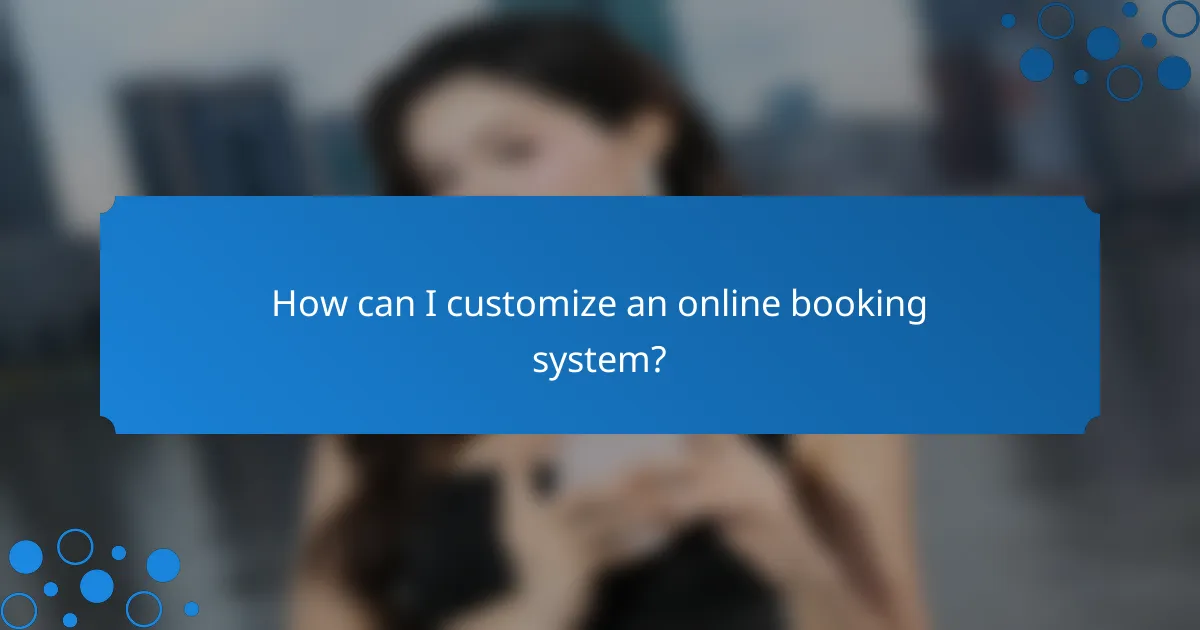
How can I customize an online booking system?
Customizing an online booking system allows businesses to tailor the platform to their specific needs, enhancing user experience and brand identity. Key customization options include branding, scheduling flexibility, and payment integration capabilities.
Custom branding options
Custom branding options enable businesses to align the booking system with their visual identity. This can include adding logos, selecting color schemes, and customizing fonts to create a cohesive look and feel.
Consider using a booking system that allows for extensive branding features, as this can significantly enhance customer trust and recognition. Ensure that the branding elements are consistent across all customer touchpoints, including emails and confirmation messages.
Flexible scheduling features
Flexible scheduling features allow businesses to set availability based on their operational hours and specific service requirements. This includes options for time slots, buffer times between appointments, and the ability to manage multiple resources or staff members.
When choosing a booking system, look for one that offers drag-and-drop scheduling, recurring appointments, and the ability to accommodate last-minute changes. This flexibility can improve customer satisfaction and reduce no-shows.
Payment gateway integrations
Payment gateway integrations are essential for processing transactions securely and efficiently. A good online booking system should support multiple payment options, including credit cards, digital wallets, and local payment methods, depending on your target market.
Ensure that the booking system complies with relevant regulations, such as PCI DSS for credit card processing. Evaluate the transaction fees associated with each payment gateway, as these can vary widely and impact your overall costs.

What integration capabilities should I look for?
When evaluating online booking systems, prioritize integration capabilities that enhance functionality and streamline operations. Key integrations include customer relationship management (CRM) systems, calendar syncing, and payment processors, which collectively improve user experience and operational efficiency.
CRM integrations
Integrating your online booking system with a CRM allows for seamless management of customer interactions and data. Look for systems that offer compatibility with popular CRMs like Salesforce, HubSpot, or Zoho, enabling automatic updates of customer information and booking history.
Consider the ease of integration and whether it supports two-way data syncing. This ensures that any changes made in the booking system reflect in the CRM and vice versa, reducing manual data entry and errors.
Calendar syncing
Calendar syncing is crucial for avoiding double bookings and managing appointments efficiently. Ensure the booking system can integrate with widely used calendars such as Google Calendar, Outlook, or Apple Calendar.
Check if the system offers real-time updates and notifications for both customers and staff. This feature helps keep everyone informed about changes in scheduling and availability, enhancing overall communication.
Payment processor compatibility
Payment processor compatibility is essential for facilitating smooth transactions. Look for booking systems that support major payment gateways like PayPal, Stripe, and Square, as well as local options that may be popular in your region.
Evaluate transaction fees, currency support, and security features such as PCI compliance. A good system will provide a range of payment options to cater to different customer preferences, ensuring a seamless checkout experience.
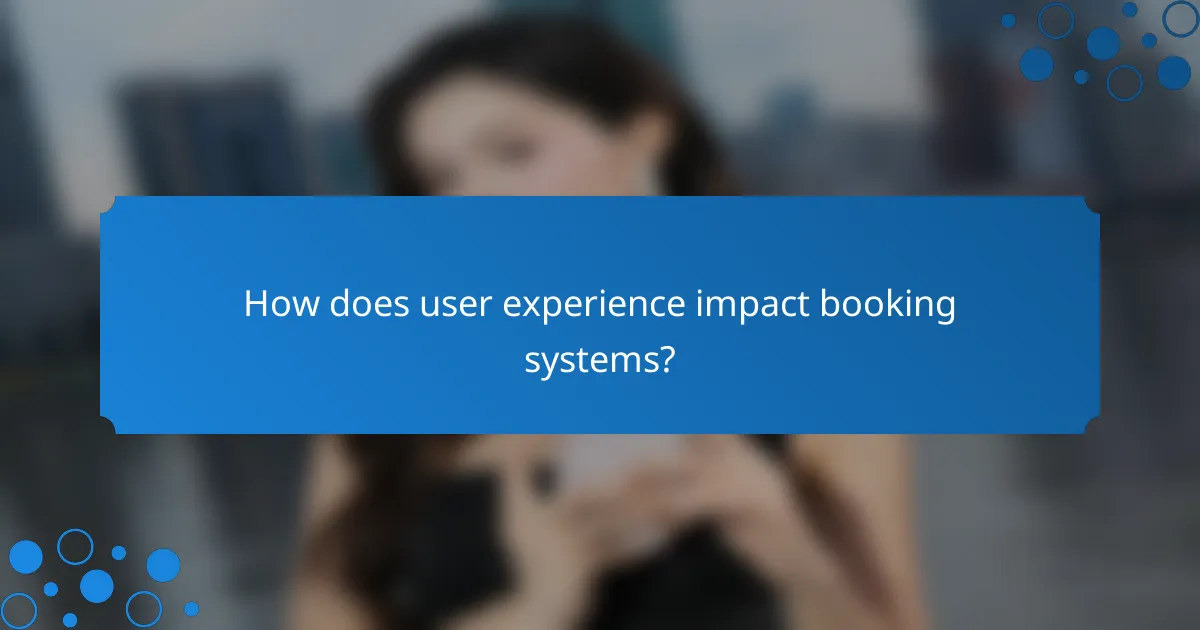
How does user experience impact booking systems?
User experience plays a crucial role in the effectiveness of online booking systems. A positive user experience can lead to higher conversion rates, while a poor experience may result in abandoned bookings and lost revenue.
Mobile responsiveness
Mobile responsiveness ensures that booking systems function seamlessly across various devices, including smartphones and tablets. With a significant portion of users accessing services via mobile, a responsive design can enhance usability and accessibility.
To optimize mobile responsiveness, consider using flexible layouts and scalable images. Test the booking process on multiple devices to identify any issues that may hinder user experience.
Intuitive interface design
An intuitive interface design simplifies the booking process, making it easy for users to navigate and complete their transactions. Clear labeling, logical flow, and minimal distractions contribute to a smoother experience.
Incorporate user feedback to refine the interface. A/B testing different layouts can help determine which design elements resonate best with users, ultimately improving engagement and satisfaction.
Customer support availability
Customer support availability is vital for addressing user concerns and enhancing overall experience. Offering multiple channels, such as live chat, email, and phone support, can help users feel more confident during the booking process.
Consider providing support during peak booking times and ensuring that response times are quick. Clear communication about support hours and availability can also reassure users that assistance is readily accessible when needed.
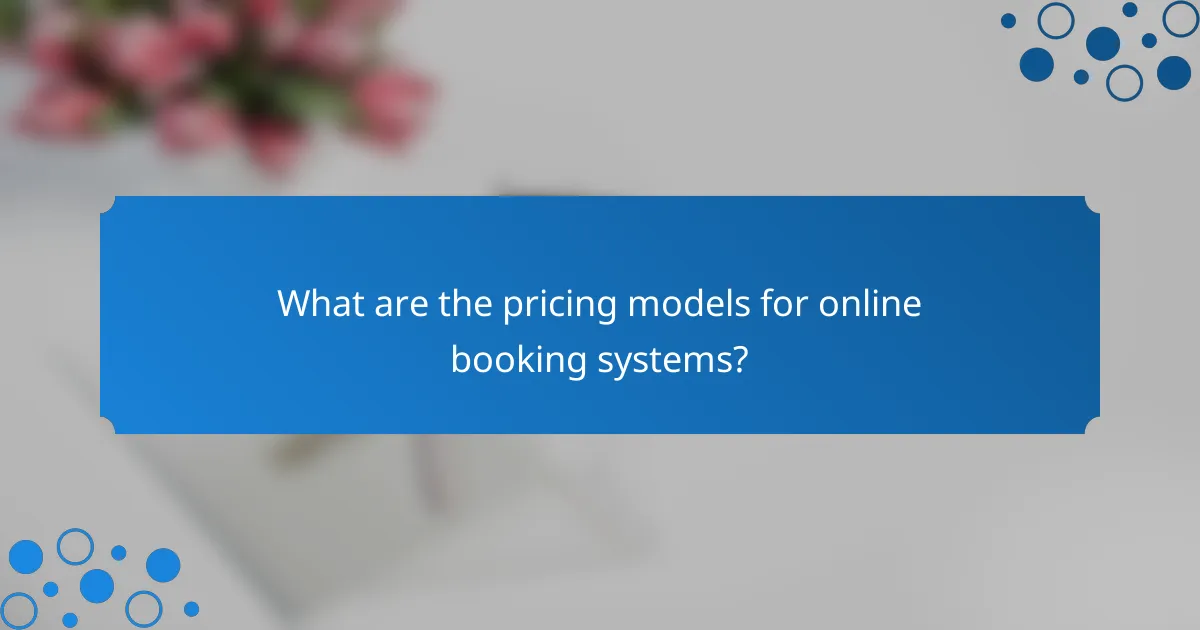
What are the pricing models for online booking systems?
Online booking systems typically offer several pricing models, including subscription-based, pay-per-use, and tiered pricing. Each model has its advantages and is suited to different business needs and usage patterns.
Subscription-based pricing
Subscription-based pricing involves paying a fixed fee at regular intervals, usually monthly or annually. This model is beneficial for businesses that require consistent access to the booking system, as it provides predictable costs and often includes regular updates and support.
When considering this model, evaluate the features included in the subscription. Some providers may offer basic functionalities at a lower price, while advanced features like analytics or integrations may come at a premium. It’s essential to choose a plan that aligns with your business size and booking volume.
Pay-per-use pricing
Pay-per-use pricing charges users based on the number of bookings or transactions processed. This model can be cost-effective for businesses with fluctuating demand, as you only pay for what you use. However, it may lead to higher costs during peak seasons.
To effectively manage costs with this model, track your booking trends and anticipate busy periods. This way, you can gauge whether a pay-per-use model is sustainable for your business or if a subscription would be more economical in the long run.
Tiered pricing
Tiered pricing offers different levels of service at varying price points, allowing businesses to choose a plan that fits their needs. Each tier typically includes a set number of features, such as booking limits, customer support levels, and additional functionalities.
When selecting a tier, consider your current and future needs. If you anticipate growth, opting for a higher tier may provide better long-term value. Additionally, review the upgrade paths to ensure that transitioning between tiers is straightforward and cost-effective.
